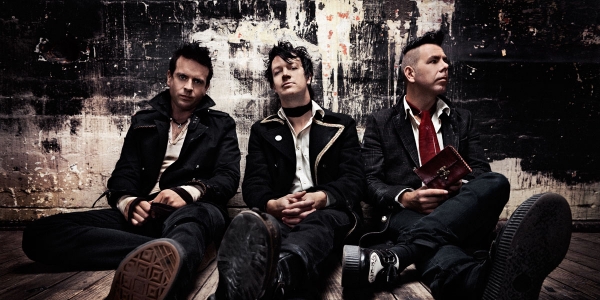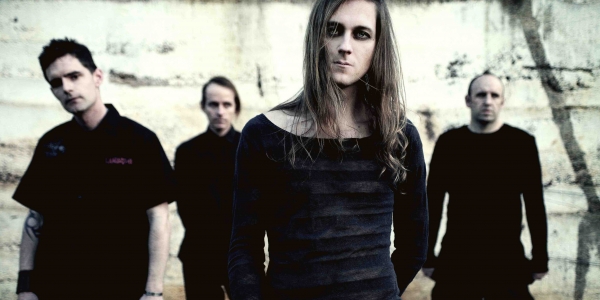So what was Cheney looking for in New York that he couldn’t find back home in Melbourne? “A break from the cold weather? No, it didn’t give me that because it was freezing cold over there,” he says with mock outrage. “Basically the idea was to get out of the neighbourhood, get out of the comfort zone, go into a different environment and just to try and soak up the influences, really. And what better place than New York? Maybe Berlin – that was the only other place I was thinking of, just because those two places, whenever I go there I just think ‘Man, there are so many creative people. There’s so much happening. It’s so vibrant!’ It makes me want to write a song.”
Cheney agonised over how long to spend in New York, worried that inspiration might not show up after all. The band had already written a few songs towards the end of the White Noise tour, and demo’d them before Cheney headed to the USA with a view to capitalising on the momentum of that 2008 album and tour as quickly as possible. “The thing I was worried about was coming home with no songs,” he says. “I thought, If I come home with no songs, Scott and Andy are going to be looking at me like, ‘Dude! What gives?’ We hoped to get back into the studio in June or July of last year. We ended up going in in February of this year, so it took quite a long time, but the thing was, I did write a lot of songs in New York and I was very inspired, and I got a lot of stuff done. There are probably four or five songs from New York that made the record. Exactly what I hoped would happen did happen.”
That songwriting process involved getting on the tube every day to soak up the atmosphere, meeting up with different songwriters, and jamming with a few different musos.”I really felt like a resident after two months,” Cheney says. “I just felt that as much as I love Australia, I didn’t miss it: I just felt like I was part of New York. It was such an inspiring time. It really did the job. It gave me inspiration. And then I came back from there and we spent the remainder of last year writing songs.” Those songs were then road-tested at a series of secret gigs in the latter half of 2010, under the name The Safety Matches, to whittle down the material to just the keepers. “We want the songs to feel worn in when we go into the studio,” Cheney says. “Not trying to remember them but just ploughing through them. We also like to find out which ones work on stage once we get back to the live thing. There’s a certain experimentation involved in that.” At one particular gig at the Espy, a couple of songs revealed their live deficiencies and were subsequently jettisoned out of the album and into hallowed “Rare mythical live song” status. “We were looking at each other going ‘Yep, this one’s not gonna make the record, because we’re not gonna play this live’,” Cheney says.
Another goal for the songwriting and arrangements was for the tracks to work well enough as a collection that the whole album could be played live, in sequence. “We wanted to have an album that we could play from start to finish: trimming songs down, stripping them, cutting off all the fat, so when we’re on stage we’re just slamming it out,” Cheney says, a process designed to ensure the band is “playing from the hips rather than thinking mathematically. We got ourselves into that mindset early last year that if anything got too complicated or sounded too intricate, we didn’t want people going to the bar, and we didn’t want people wandering off in their mind while we’re playing a track. It was a matter of grabbing the listener from the start. I think it’s our most cohesive record for that reason. Every song sits with the others.”
The Ending Is Just The Beginning Repeating features all the expected Living End trademarks – rockabilly riffs, uptempo punky urgency, axe-driven rave-ups, ska, pop melodies – but the band also flirts with a few other forms, particularly Police-inspired chorused guitar tones and a few flashes of full-on metal, such as the intro to the track Machine Gun. The band stumbled upon this supremely heavy riff but weren’t sure what to do with it for a while. “We felt it was fun to play but it was just a little bit too metal for us,” Cheney says. “We just didn’t think it was going to work: it’s fun to play, but we’re not a metal band. We didn’t want to have anything that made people think ‘What are they trying to be? What are they trying to prove here?’ So it was a case of then trying to juxtapose that with a completely different element alongside that.” The solution was to pair the heavy intro riff with reggae-based verses, playing up the danceability and grooviness against the aggression of the intro. “I just thought that if we’d just started with that heavy riff and the whole song was like that, it would kinda sound like we were trying to be Metallica or something. It was a matter of giving it some class, I think, and showing that we can do this metal riff but then break into a groove that really has a great feel to it!”
The short album is a difficult beast to master: do you use the short burst of time to make a direct, one-sound album, or do you try to include enough variety to make it seem longer than 40 minutes? The Living End chose the latter. “We’ve always been a band that likes different kinds of music – all roots-derived: ska, reggae, punk rock, rockabilly, blues… it’s all been a big melting pot that The Living End has kinda drawn from over the years,” Cheney says,” but I think in the past there have been moments where we’ve tried to do something on record that has probably been a little bit beyond our realm. This time what we did was, when we would try something different stylistically, we would make sure it was executed well enough and it was simple enough that it could get the idea across, and that it didn’t sound like a band that was chasing an idea: it sounded like a band in charge of an idea. We felt we were on top of it this time and we weren’t trying to keep up with the song. just think that you’ve got to have some variety or else you just sound like a one-trick pony, but if you have too much, people can get halfway through a record and go “Hang on, what band is this again?” We wanted it to sound like us, but still have the diversity. I think we’ve found the right balance this time.”
Although Cheney can shred with the best of them, his guitar playing on The Ending Is Just The Beginning Repeating is more restrained than in the past. Where once his solos were so jaw-droppingly fast and powerful that they helped the band win over even the notoriously fickle AC/DC crowd during support slots, the leads on the new album are generally more about melody than flash. You’ve got to know when to hold ’em, know when to fold ’em. “Thanks Kenny! I guess it’s just youthful enthusiasm and naivety: ‘Check this out!” Check out how clever I can be!’ And I think you get to a point where you realise it’s a lot more clever to leave stuff out. There’s a maturity to all of our playing on this record that’s a really good balance: It’s still got that bratty kind of spirit and energy in parts, but there’s a restraint there that you can only get after playing for a number of years.” Cheney says restraint wasn’t even in the band’s vocabulary in the early days, and he would often push his technique further than his comfort zone to nail a mind-blowing solo. “But there were also times where I did simplify a solo, but then I would listen back to a take and go, ‘Nup, it’s impressive but it just sounds like a guitar clinic or something.’ I want to play something that actually has melody and suits the song and sounds like it’s just part of the song, rather than, ‘Okay, guitar hero step up now!’ – that part where you stand up on the foldback wedges and solo your ass off. I’ve been criticised for that, and I think a little bit in the last couple of records people have said ‘Where are all the guitar solos? Where’s the crazy guitar playing?’ But it’s in there, it’s just not as flashy.”
Cheney says the band’s rhythmic undercurrent is picking up some of the technicality that is being stripped from the guitar solos. “If anything, some of the rhythmical stuff is a lot more difficult, it’s just that it’s more subtle,” he says. “You don’t notice it as much, as opposed to the hundred-note solo. I don’t think I’ve deteriorated as a guitar player by any means, it’s just that there’s a little more class there now and a little less Vegas flash! A big part of this record for me was coming up with alternate tunings and locking in with the three of us playing. A song like Heatwave is a really difficult song to play, and it’s really about the accuracy and the precision. That’s probably one of the more flashy ones I suppose, but it’s a bit more subtle. I guess on the surface it seems less impressive, but the thing I like about this record is that it’s a bit of a grower. It’s not a first-listen thing. And I hope that it has some longevity.”







